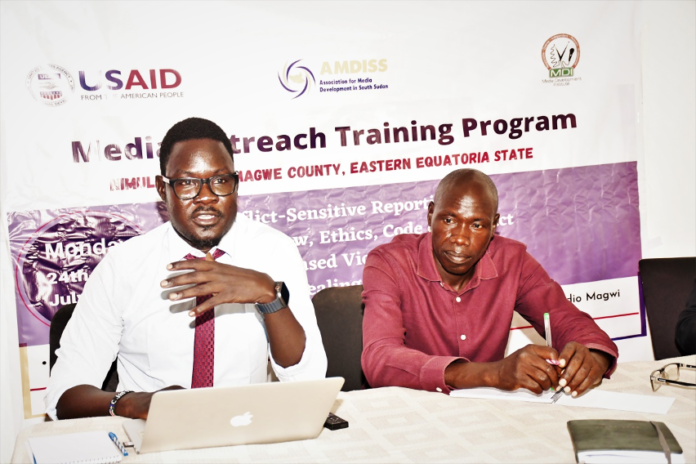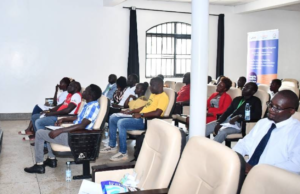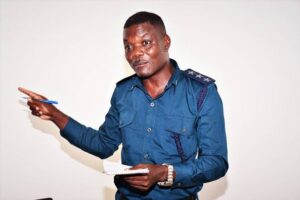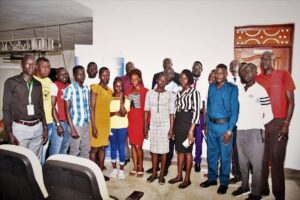
The Deputy Secretary General of the Association for Media Development in South Sudan (AMDISS), Chuol Jany has called on journalists to play a vital role in disseminating credible information on electoral laws and voter registration.
This came as South Sudan prepares for its first-ever general elections timed to take place at the end of the transitional period in December next year 2024.
Jany remarked during a three-day media training in Nimule town, attended by 21 journalists drawn from the RMC 101.5 FM Radio, NTC 87.3 FM Radio, and 91.0 Voice of Freedom Radio FM Radio broadcasting in Magwe County of Eastern Equatoria State, supported by the USAID.

He [Jany] advised the media houses to give equivalent time to competing political candidates to encourage the spirit of political pluralism during and after the anticipated general elections.
“In our country, there is an expectation that maybe we shall have elections in the coming 2024; media should remain a middle ground for all and should give equivalent time to all the competing political candidates during the elections,” Jany said.
“Are you prepared for elections,” Jany questioned the reporters. “As journalists, which side are you going to give attention to? Are you going to favor one party and neglect the others? Are you going to give time to big parties and eliminate the smaller ones?
“Are you going to favor the party that has soldiers and neglect the parties that have no soldiers? Give equal time to competing political candidates,” he emphasized.
The revitalized peace agreement provides that the unity government conducts a free, fair, and credible election in December 2024, giving the people of South Sudan a rare opportunity to exercise their democratic right to elect their leaders through secret ballots.
However, the unification and deployment of the necessary unified forces to keep the law and order during the elections as well as the repatriation of the refugees back home to take part in the elections lags behind, the main political powers in the country are pushing harder for next year’s elections.
Chuol Jany, who is also the editor-in-chief of the Catholic Radio Network (CRN)—a network of community Church base radio stations— called on the government and security agencies to respect media freedom, open civic space, and grant access to information to enable the media to feed the public with credible information during and after the elections.
On the same note, Chuol Jany appealed to the media to promote diversity in their newsroom and programming and refrain from biases to regain the public trust and confidence in the public and independent media.
“I understand that in Eastern Equatoria there are many tribes, the media should have inclusive programming to avoid biases,” he stressed. “If you realized that some of the communities are not represented in your programming, please adjust and have inclusive content to promote diversity.”
“You journalists, you are popular because the communities regard you as their voice and therefore, you have to preserve this by not inciting the communities against each other in the coming elections,” Jany warned.
Speaking in the same event, the Deputy Chief Inspector of Police in Nimule Town, Captain James Francis acknowledged the positive role the media is playing to inform and educate the public on the socioeconomic and political issues in the country.

Captain Francis however, challenged the radio stations operating in Nimule Town to always verify the information before disseminating it to the public, saying his office remains open for journalists in the town.
“The role of the media is to inform and educate the public accurately,” Captain Francis said.
“I am happy because AMDISS has come in to capacitate the journalists in Nimule Town and Magwe County. Unfortunately, the media has been reporting unverified content.”
“This is a crime. You should verify the information before you disseminate it for public consumption. This unethical way of reporting could cause division in society,” Captain Francis advised.
He also expressed dissatisfaction with some of the contents being disseminated on the radio stations in Nimule Town.
Police representatives also advised that the radio stations should broadcast programs in the languages understood by the majority of people in Nimule Town.
“Most of your programs are in the Madi language but if you look at the statistic of radio listeners in Nimule Town do not speak or understand the Madi language.”
You should not rely on information shared by unofficial sources. Cross-check your sources before sending or disseminating the information provided.
The programs should be in a language understood by communities here to avoid misinformation. Nimule is a border town with diverse communities and nationalities.
These people deserve to also know what is happening in the town and radio is an effective means that they rely on for information,” he urged.
On the other hand, the Deputy Town Clerk of Nimule Town Council, Longwa Julius praised AMDISS for visiting Nimule Town for the first time to train the journalists who are in dire need of capacity building to report the news accurately for the benefit of the public.

He cautioned the journalists against reporting premature information that could destabilize the people of Nimule Town.
“Do not report premature information,” Julius appealed. “Always report the right information to the public.
If you share premature information, it may sometimes cause problems that are not good. This is why you are here today so that you acquire more knowledge to report professionally,” he added.
The tailor-made capacity-building training supported by the USAID aimed at equipping the journalists in Nimule and Magwe with the necessary skills in conflict-sensitive reporting as the country prepares for general elections next year 2024.
